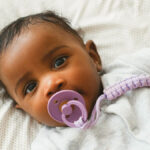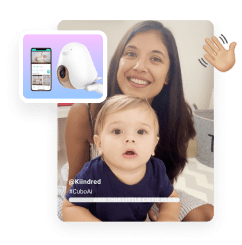RSV: Everything you need to know
As a parent, there is nothing more distressing than when your child is sick. It’s our basic human instinct to want to protect them and take their pain away but how do you know the difference between a common cold or something more serious like RSV Bronchiolitis? RSV infections during the winter months are rife so we spoke to holistic paediatrician Dr Deb Levy for the full lowdown on what RSV is, how to spot it in your little one and when you need to seek further help.
What does RSV stand for?
RSV stands for respiratory syncytial virus and essentially it’s the name of a virus. It happens to be one of the most common causes of a cold or, in younger children, also bronchiolitis.
In older children (two years and up) or in adults, RSV would typically cause a simple cold. Think snotty nose and maybe a bit of a cough. Younger children however are more susceptible to developing bronchiolitis.
Bronchiolitis is an infection or inflammation of the lungs. Looking at the lungs anatomically, they’re like an upside-down tree with the tree trunk being the big windpipe and then all the little branches within the lung – and it’s all those little branches that get impacted by RSV. This means your child can develop problems with their breathing.
Symptoms of RSV:
- Snotty nose
- Fever
- Cough (intermittent but in younger children the cough can become more persistent)
- Wheezing – look out for that same kind of wheezing you get in asthma, that musical sound as your child breathes out. This happens because those little airways are infected, inflamed and swollen and it makes it harder for the air to move as your child is breathing
- Feeding problems – it can be hard for babies with blocked noses or breathing problems to feed normally
- Breathing difficulty or respiratory distress
TIP: Paediatric nurse Sarah Hunstead from CPR Kids recommends removing all of your child’s clothes to monitor their breathing. “Take their top or onesie off. If you are worried about your child’s breathing, you are unwrapping them, taking their clothes off and having an in-depth look at how they’re breathing,” Sarah advises.
Get tailored content based on your week of pregnancy
By signing up, you agree to receiving our Newsletters. Cancel anytime.



The signs of respiratory distress:
- Flaring their nostrils
- Making a grunting noise with their breathing
- Head bobbing when breathing, especially in younger children
- They use more muscles to breathe and they get a tracheal tug or recessions in their neck
- Laboured and rapid breathing
RSV and feeding:
The tip that I would give is to make sure your baby is having regular wet nappies. At least six in a day would be a good indicator that they’re well hydrated. And if they’re not managing a very long feed, you obviously need to see your doctor but also try shorter feeds more frequently. That way, they’re getting that same volume but it’s less effort to get it.
The other thing you can try is saline nasal spray prior to a feed. These are little tips you can use while you’re waiting to see your doctor for a proper review.
When should I take my baby to hospital?
When babies have bronchiolitis the two main indicators to admit them to the hospital are: are they feeding OK? And are they working really hard to breathe or needing extra oxygen?
Often when babies are admitted to the hospital, they don’t need oxygen yet but they’re really not managing with their feeding so sometimes they will need a nasogastric feeding tube, which goes up their nose and into their tummies just to help them with that recovery period.
What is the fastest way to cure RSV?
As with the majority of viruses, there’s no specific cure and antibiotics will not help. Often it’s just time and supporting them through that period.
How do children get RSV?
Children get it through contact with someone else who has it. It’s spread by droplets (coughing and sneezing) and by direct contact. This is why you should never kiss a baby as it’s easily transmissible through kissing.
Also remember to wash your toys regularly because if a child has RSV and does a cough splutter on a toy, it can stay there for several hours. Remember to practice good hygiene and hand washing at all times. When possible, also keep unwell children away from other children.
How long is RSV infectious for?
The infectivity period is quite long, around ten days. Fevers or a snotty nose are usually the first sign of infection, with breathing problems then starting and peaking in severity within the first 5 days. It’s natural for things to get worse with RSV before they get better.
How long does it take to fully recover from RSV?
Children are usually unwell for one to two weeks but the cough can last a lot longer.
As long as they’re not having difficulty with their feeding and breathing and there are no other worrying symptoms like high fevers, then usually it’s just a case of monitoring them.
Can you catch RSV more than once?
Unfortunately, you can get it again and again. You develop a degree of immunity after each infection, but this doesn’t last long.
The key takeaways to remember are that the younger your child is, the more susceptible they are for RSV to develop into bronchiolitis, monitor your child closely and when in doubt – especially when it comes to their breathing – don’t ever hesitate to call an ambulance or take them straight to the emergency room.
Related Articles
8 things you need to know about snot in children
Managing work with a sick baby
5 things in your home that could be affecting your child’s health
Related Articles

Dr Deb Levy Follow +
Dr Deb is a dedicated holistic paediatrician. With 15 years experience as a children's doctor and a Fellow of the Royal Australasian College of Physicians in General Paediatrics and Paediatric Emergency Medicine. Dr Deb follows an evidence-based approach and combines the latest medical research with lifestyle and dietary advice to best care for your child. Beyond her...





